Curcumin and synthetic analogs induce reactive oxygen species and decreases specificity protein (Sp) transcription factors by _targeting microRNAs
- PMID: 23194063
- PMCID: PMC3522018
- DOI: 10.1186/1471-2407-12-564
Curcumin and synthetic analogs induce reactive oxygen species and decreases specificity protein (Sp) transcription factors by _targeting microRNAs
Abstract
Background: Curcumin inhibits growth of several cancer cell lines, and studies in this laboratory in bladder and pancreatic cancer cells show that curcumin downregulates specificity protein (Sp) transcription factors Sp1, Sp3 and Sp4 and pro-oncogenic Sp-regulated genes. In this study, we investigated the anticancer activity of curcumin and several synthetic cyclohexanone and piperidine analogs in colon cancer cells.
Methods: The effects of curcumin and synthetic analogs on colon cancer cell proliferation and apoptosis were determined using standardized assays. The changes in Sp proteins and Sp-regulated gene products were analysed by western blots, and real time PCR was used to determine microRNA-27a (miR-27a), miR-20a, miR-17-5p and ZBTB10 and ZBTB4 mRNA expression.
Results: The IC50 (half-maximal) values for growth inhibition (24 hr) of colon cancer cells by curcumin and synthetic cyclohexanone and piperidine analogs of curcumin varied from 10 μM for curcumin to 0.7 μM for the most active synthetic piperidine analog RL197, which was used along with curcumin as model agents in this study. Curcumin and RL197 inhibited RKO and SW480 colon cancer cell growth and induced apoptosis, and this was accompanied by downregulation of specificity protein (Sp) transcription factors Sp1, Sp3 and Sp4 and Sp-regulated genes including the epidermal growth factor receptor (EGFR), hepatocyte growth factor receptor (c-MET), survivin, bcl-2, cyclin D1 and NFκB (p65 and p50). Curcumin and RL197 also induced reactive oxygen species (ROS), and cotreatment with the antioxidant glutathione significantly attenuated curcumin- and RL197-induced growth inhibition and downregulation of Sp1, Sp3, Sp4 and Sp-regulated genes. The mechanism of curcumin-/RL197-induced repression of Sp transcription factors was ROS-dependent and due to induction of the Sp repressors ZBTB10 and ZBTB4 and downregulation of microRNAs (miR)-27a, miR-20a and miR-17-5p that regulate these repressors.
Conclusions: These results identify a new and highly potent curcumin derivative and demonstrate that in cells where curcumin and RL197 induce ROS, an important underlying mechanism of action involves perturbation of miR-ZBTB10/ZBTB4, resulting in the induction of these repressors which downregulate Sp transcription factors and Sp-regulated genes.
Figures
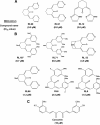
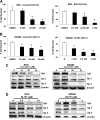
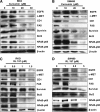
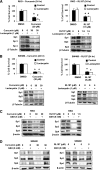
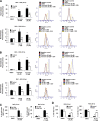
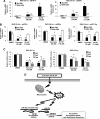
Similar articles
-
Betulinic acid inhibits colon cancer cell and tumor growth and induces proteasome-dependent and -independent downregulation of specificity proteins (Sp) transcription factors.BMC Cancer. 2011 Aug 24;11:371. doi: 10.1186/1471-2407-11-371. BMC Cancer. 2011. PMID: 21864401 Free PMC article.
-
GT-094, a NO-NSAID, inhibits colon cancer cell growth by activation of a reactive oxygen species-microRNA-27a: ZBTB10-specificity protein pathway.Mol Cancer Res. 2011 Feb;9(2):195-202. doi: 10.1158/1541-7786.MCR-10-0363. Epub 2010 Dec 14. Mol Cancer Res. 2011. PMID: 21156786 Free PMC article.
-
The drug resistance suppression induced by curcuminoids in colon cancer SW-480 cells is mediated by reactive oxygen species-induced disruption of the microRNA-27a-ZBTB10-Sp axis.Mol Nutr Food Res. 2013 Sep;57(9):1638-48. doi: 10.1002/mnfr.201200609. Epub 2013 Mar 8. Mol Nutr Food Res. 2013. PMID: 23471840
-
Unifying mechanisms of action of the anticancer activities of triterpenoids and synthetic analogs.Anticancer Agents Med Chem. 2012 Dec;12(10):1211-20. doi: 10.2174/187152012803833099. Anticancer Agents Med Chem. 2012. PMID: 22583404 Free PMC article. Review.
-
Specificity Proteins (Sp) and Cancer.Int J Mol Sci. 2023 Mar 8;24(6):5164. doi: 10.3390/ijms24065164. Int J Mol Sci. 2023. PMID: 36982239 Free PMC article. Review.
Cited by
-
MiR-135a and MRP1 play pivotal roles in the selective lethality of phenethyl isothiocyanate to malignant glioma cells.Am J Cancer Res. 2016 May 1;6(5):957-72. eCollection 2016. Am J Cancer Res. 2016. PMID: 27293991 Free PMC article.
-
Evidence for Multilevel Chemopreventive Activities of Natural Phenols from Functional Genomic Studies of Curcumin, Resveratrol, Genistein, Quercetin, and Luteolin.Int J Mol Sci. 2022 Nov 29;23(23):14957. doi: 10.3390/ijms232314957. Int J Mol Sci. 2022. PMID: 36499286 Free PMC article. Review.
-
Yin Yang 1 (YY1): Regulation of Survivin and Its Role In Invasion and Metastasis.Crit Rev Oncog. 2017;22(1-2):23-36. doi: 10.1615/CritRevOncog.2017020836. Crit Rev Oncog. 2017. PMID: 29604934 Free PMC article. Review.
-
Involvement of PTEN and FOXO3a Proteins in the Protective Activity of Protocatechuic Acid Against Cisplatin-Induced Ovarian Toxicity in Mice.Reprod Sci. 2021 Mar;28(3):865-876. doi: 10.1007/s43032-020-00305-4. Epub 2020 Nov 10. Reprod Sci. 2021. PMID: 33174187
-
Medicinal chemistry of the epigenetic diet and caloric restriction.Curr Med Chem. 2013;20(32):4050-9. doi: 10.2174/09298673113209990189. Curr Med Chem. 2013. PMID: 23895687 Free PMC article. Review.
References
-
- Koehn FE, Carter GT. The evolving role of natural products in drug discovery. Nat Rev Drug Discov. 2005;4:206–220. - PubMed
-
- Butler MS. The role of natural product chemistry in drug discovery. J Nat Prod. 2004;67:2141–2153. - PubMed
-
- Aggarwal BB, Shishodia S. Molecular _targets of dietary agents for prevention and therapy of cancer. Biochem Pharmacol. 2006;71:1397–1421. - PubMed
-
- Sharma RA, McLelland HR, Hill KA, Ireson CR, Euden SA, Manson MM, Pirmohamed M, Marnett LJ, Gescher AJ, Steward WP. Pharmacodynamic and pharmacokinetic study of oral Curcuma extract in patients with colorectal cancer. Clin Cancer Res. 2001;7:1894–1900. - PubMed
Publication types
MeSH terms
Substances
Grants and funding
LinkOut - more resources
Full Text Sources
Other Literature Sources
Research Materials
Miscellaneous

